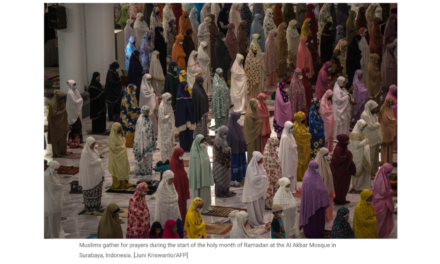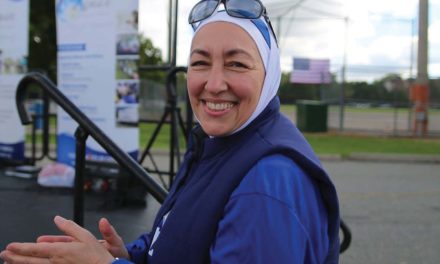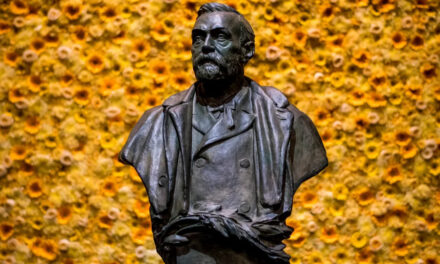This is the story of a walz in three-quarter time which is fast becoming the rallying song of Arab youth. ‘Telk Qadeya’ is the Egyptian rock group Cairokee ’s latest single, ‘with a twist’ as they put it. It was issued on 30 November 2023, nearly two months after the start of the genocidal war on Gaza. It was announced on the group’s official accounts very soberly, with no grandiloquent proclamations. But the song has had over a million views on YouTube alone and has been available since the end of November on the Lebanese channel Al-Maya deem, illustrated with videos of the Gaza bombings. While the words ‘Gaza’ or ‘Palestine’ do not appear in the lyrics, everyone knows perfectly well what they are about, and at what world order – epitomised by the plight of the occupied territories – this song points an accusing finger.
Widely shared ever since it premiered, the title can be found on the social network accounts of Gazan Palestinians, adopted thus by the very people for whom it is intended to speak out. And the group was invited to perform at the closing ceremony of the Egyptian film festival at El-Guna on 21 December 2023 where, contrary to the Red Sea Film Festival in Jedda, which ended just a few days earlier, events in Palestine were constantly foregrounded.
From the Egyptian revolution to occupied Palestine
With this new title, ‘Telk Qadeya’, Cairokee is returning to its original practice of political songs. The group was formed in Cairo in 2003 and had its first big hit in 2011 with a song which would act as the ‘soundtrack’ for the revolution of 25 January 2011, ‘Sout Al-Horeya’ (‘The Voice of Freedom’). The clip featured actor-singer Hany Adel, then a member of the group Wust El Balad. It was shot on Tahir Sqaure, the day after the departure of Hosni Mubarak.
Since then, Cairokee has had many hits as well as its lot of problems with the censors, in particular for the 2017 album No’ta Beeda (‘Point Blank’) which is not available in Egypt. For contrary to other groups, Cairo kee will not compromise with President Abdel Fatah Al-Sissi’s regime. And so today the marketing of ‘Telk Qadeya’, with lyrics by Mostafa Ibragim, the melancholic poet of the Egyptian revolution, represents a return to the group’s original commitments.
Expelled from the humans
As the song unfolds, it draws an unflattering picture of the political situation in Israel-Palestine, showing the depth of the gulf that has been dug since 7 October:
The lyrics do not merely point up the selective indignation and double standard practised in the Western world which excludes the Palestinians from humans, ‘as if the earth in which they’re buried/Is not of this earth.’ They also point out the deep-rooted logic of that part of the world, crowing over societal struggles – gender, colour, environment – proof of a moral progress seen as the exclusive property of the West, at the same time remaining indifferent to the fate of human beings who do not belong to its cultural sphere.
‘This is one issue and that’s another’ the song insists in the face of those who ‘save sea turtles while killing human animals or that other man who ‘sugar-coat titles and names/While an army demolishes a nearby school’.
Ruptured Confirmed
The lyrics of this judgement are served by the deep, calm voice of Amir Eid, the leader of the group. During the first part of the number, he addresses the Other. But as the music swells, an oriental rhythm mingles with the walz, and violins make their entrance while the singer’s voice climbs into the trebles. He no longer addresses those who are ‘placing killers on a par with their victims/ With honesty and fairness/And in all neutrality -a sarcastic allusion to the media rhetoric which dons the cloak of objectivity to justify the obliteration of the ongoing massacre – he is talking now to those who “rise from the rubble” and he tells them:
By referring explicitly to armed struggle, the song challenges the legal norms established by the West and which it is the first to violate. It legitimises the refusal to depend upon those who hold forth with an empty rhetoric which has only anaemic condemnations to offer’ to stop the carnage.’
It is out of the question here to call for surrender. Just expect nothing more from the opposite camp:
Two paradigms are pitted one against the other: ‘That’s one issue/And that is an honorable struggle, the singer’s voice concludes before fading away in an electric guitar solo tinted with the harmonies of the blues.
At the same time ‘Telk Qaaeya’ first released, Cairokee published the English translation of the lyrics. The picture on the single’s cover showed a bust of the Statue of Liberty with two heads, denoting the doublespeak of the West, in the centre of a blood-red tableau. The message couldn’t be clearer for anyone prepared to listen.
















